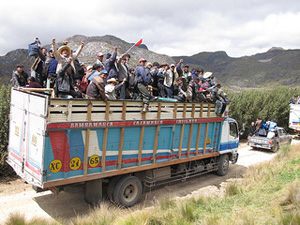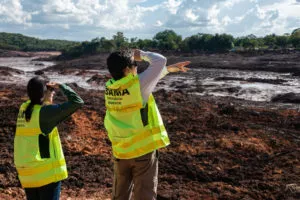After the deadly 2019 tailings dam failure in Brumadinho, Brazil that killed 272 people, investors from Principles for Responsible Investment (PRI), the United Nations Environment Programme (UNEP), and the mining industry, represented by the industry trade group the International Council on Metals and Mining (ICMM), co-convened the Global Tailing Review with the objective “to review current global best practices in the mining industry, and beyond, and based on this information develop an international standard that creates a step change for the industry in the safety and security of tailings storage facilities (TSFs).”
A recently released book, Credibility Crisis: Brumadinho and the Politics of Mining Industry Reform by Andrew Hopkins and Deanna Kemp, examines the unequal process used to develop and approve the Global Industry Standard on Tailings Management (GISTM) in 2020 that is now being held up by the three co-convenors as the benchmark standard on tailings.
Authored by two distinguished social scientists with decades of experience in extractive industries, corporate responsibility and major accidents, the book is meticulous, measured and restrained, but provides a stinging indictment of how the mining industry uses its power and influence to ensure that its interests are protected above all else. Using concrete examples, it shows that the industry’s “lack of openness, adaptability and willingness to listen, and to share power, goes to the heart of the politics embedded in the [Global Tailings Review] process. It is also symptomatic of the arrangements that underpin the way the industry operates.”
They should know. Kemp and Hopkins were members of an independent Expert Panel tasked with drafting a standard for the co-conveners to review.
“ …the development of the Standard was ostensibly based on 2 principles,” they say in the book. “The first was that the 3 co-conveners were formally equals, wielding equal decision-making power. The second was that the initial drafting by the expert panel was to be conducted in an independent manner. Neither of these principles was adhered to. The ICMM, in reality, always believed its views should carry greater weight than the views of the other 2 co-conveners. Moreover, it frequently sought to exert pressure on the expert panel.”
The book details how ICMM pressured, intimidated and at some points manipulated the Expert Panel to create a standard that favored the mining industry’s interests. It also shows how investors and the United Nations were unable or unwilling to use the same tactics and were often out-negotiated. The outcome was a weak standard that doesn’t make the necessary changes to keep communities safe from the next tailings dam failure.
While the authors support the final standard, their book describes how it fell short on many critical issues. For example, the book goes into detail of how ICMM lobbied to reduce the scope of the GISTM from the outset, hamstringing the Expert Panel and their influence over the final standard. The authors note that if a ban on upstream dams or riverine tailings disposal hadn’t been already excluded from the scope, the Expert Panel would have likely considered and debated whether to include both bans in the standard. Hopkins and Kemp worry that by excluding a ban on riverine tailings disposal from the GISTM, “the co-conveners appear to be endorsing the practice.”
The preamble of the GISTM commits to strive for zero harm towards people and the environment and zero tolerance for human fatality, but the standard itself failed to deliver. The GISTM’s Hazard Classification System does not require all tailings dams whose failures could lead to fatalities be designed and constructed to the highest engineering and safety standards. This led the authors of Credibility Crisis to say, ”It is painful for us to read [the preamble] now because the reality is that the Standard manifestly fails to show zero tolerance for human fatality.”
The authors also describe how ICMM attempted to weaken the requirements around Free, Prior and Informed Consent (FPIC) for Indigenous Peoples. The trade organization pushed so hard that UNEP threatened to walk away from the entire process. In the end, the negotiations favored ICMM and the standard says mining companies must “work to obtain and maintain” FPIC, which is very different from actually giving communities the right to say no to a mining project.
Another area where the standard fell short of both the conveners and civil society’s expectations was around the issue of financial assurance and insurance for tailings facilities. While the Expert Panel included strong assurance provisions and an insurance requirement in the first draft, ICMM succeeded in significantly weakening the financial assurance language and making the insurance wording “largely meaningless,”overriding the concerns of investors and UNEP. The authors claim that, “ICMM gave no ground, UNEP gave a great deal, and the PRI adopted a mediator role between ICMM and UNEP. In the end, the only way an agreement was going to be reached was if UNEP and the PRI capitulated to the ICMM.”
UNEP and the investors have announced the formation of an “independent international institute” to oversee the GISTM. It is critically important that this independent institution include key civil society stakeholders and rights-holders, including affected communities, Indigenous Peoples, labor, and NGOs. Communities and workers must have equal representation in the decisions that directly impact their safety and livelihoods. However, as the authors of Credibility Crisis point out, “ICMM members are in no way committed to the establishment of an independent entity that might constrain their interests by giving greater weight to the rights and interests of project-affected peoples.”
Safety must take priority in tailings management and safer alternatives already exist, like those outlined in Safety First: Guidelines for Responsible Mine Tailings Management. As governments, regulators, investors and international agencies try to improve tailings management, they must look to affected communities and workers to guide their work. As Credibility Crisis shows, the mining industry can not be trusted to regulate itself. The glaring shortcomings the industry pushed in the GISTM will have real-life consequences for the safety and health of communities and ecosystems.
Your Support Makes Our Work Possible
Earthworks helps families on the front lines of mining, drilling, and fracking. We use sound science to expose health, environmental, economic, social, and cultural impacts of mining and energy extraction. To support our efforts, please consider a tax-deductible donation today that will go toward our work reforming government policies, improving corporate practices, influencing investment decisions, and encouraging responsible materials sourcing and consumption.


